
OER Spanish 101 taught at Mohave Community College.
- Subject:
- Arts and Humanities
- Material Type:
- Full Course
- Author:
- Susanlee Martino
- Date Added:
- 06/06/2024
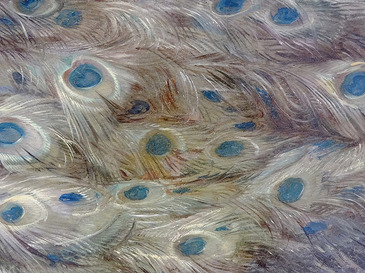

OER Spanish 101 taught at Mohave Community College.

OER Spanish 102 course taught at Mohave Community College.
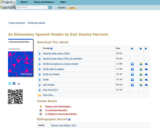
The increasing study of Spanish in high schools and colleges has made necessary the preparation of a text of a simpler character than those now in common use.
In the present text, especially in the first selections, the language has been simplified so that reading may be begun at a very early stage in the pupil's work. It has not been considered necessary to supply notes, as the matter is simple and the vocabulary furnishes all necessary information. All verb forms occurring in the text, whether regular or irregular, are given in the vocabulary.
There is constant repetition of common words and expressions, so that comparatively long lessons may be assigned and the pupil may be enabled to acquire an extensive knowledge of useful every-day Spanish and become familiar with the structure of the Spanish sentence at an earlier period than has been possible heretofore.
Selection XII is taken from "Tradiciones y leyendas españolas" by Don Luciano García de Real (Barcelona, 1898). Selections IV, VI, IX, X, XIII, are taken from the "Biblioteca de las tradiciones populares españolas" (Madrid, 1886). The remaining selections are taken from various sources or adapted from English or German.
Many changes have been made in all the selections, except in the fables of Iriarte and the story by Fernán Caballero, in order to render the material suitable for beginners.

Elementary Swahili: Lugha na Utamaduni is intended for both heritage and non-heritage elementary Swahili learners. It introduces the learners to aspects of Standard Swahili language and culture with the view of enhancing their intercultural competence in Swahili. The topics are well-integrated to enable the learners to easily apply what they learn in each topic into their daily interactions in Swahili about themselves, family, friends, immediate world, and East Africa. Thus, at the end of Elementary Swahili, learners should be able to carry out basic conversations in Swahili about themselves, their world, and East Africa. Further, the coursebook will incorporate common Swahili cultural practices in all the topics with the view of enhancing the learners’ intercultural competence.

This free and open access textbook introduces new writers to some basic elements of the craft of creative writing in the genres of fiction, poetry, and creative nonfiction. The authors—Rachel Morgan, Jeremy Schraffenberger, and Grant Tracey—are editors of the North American Review, the oldest and one of the most well-regarded literary magazines in the United States. They’ve selected nearly all of the readings and examples (more than 60) from writing that has appeared in NAR pages over the years. Because they had a hand in publishing these pieces originally, their perspective as editors permeates this book. As such, they hope that even seasoned writers might gain insight into the aesthetics of the magazine as they analyze and discuss some reasons this work is so remarkable—and therefore teachable. This project was supported by NAR staff and funded via the UNI Textbook Equity Mini-Grant Program.
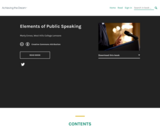
Word Count: 87381
(Note: This resource's metadata has been created automatically by reformatting and/or combining the information that the author initially provided as part of a bulk import process.)

This course surveys the social, cultural, and political development of western Europe between 500 and 1350. A number of topics are incorporated into the broad chronological sweep of the course, including: the Germanic conquest of the ancient Mediterranean world; the rise of a distinct northern culture and the Carolingian Renaissance; the emergence of feudalism and the breakdown of political order; contact with the Byzantine and Islamic East and the Crusading movement; the quality of religious life; the vitality of the high medieval economy and culture; and the catastrophes of the fourteenth century.
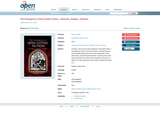
Provides a new account of the emergence of Irish gothic fiction in mid-eighteenth century. This book provides a robustly theorised and thoroughly historicised account of the ‘beginnings’ of Irish gothic fiction, maps the theoretical terrain covered by other critics, and puts forward a new history of the emergence of the genre in Ireland. The main argument the book makes is that the Irish gothic should be read in the context of the split in Irish Anglican public opinion that opened in the 1750s, and seen as a fictional instrument of liberal Anglican opinion in a changing political landscape. By providing a fully historicized account of the beginnings of the genre in Ireland, the book also addresses the theoretical controversies that have bedevilled discussion of the Irish gothic in the 1980s, 1990s and 2000s. The book gives ample space to the critical debate, and rigorously defends a reading of the Irish gothic as an Anglican, Patriot tradition. This reading demonstrates the connections between little-known Irish gothic fictions of the mid-eighteenth century (The Adventures of Miss Sophia Berkley and Longsword), and the Irish gothic tradition more generally, and also the gothic as a genre of global significance. Key Features * Examines gothic texts including Mary Shelley's Frankenstein, Horace Walpole's The Castle of Otranto, Bram Stoker's Dracula, Charles Robert Maturin's Melmoth the Wanderer, (Anon), The Adventures of Miss Sophia Berkley and Thomas Leland's Longsword * Provides a rigorous and robust theory of the Irish Gothic * Reads early Irish gothic fully into the political context of mid-eighteenth century Ireland This title was made Open Access by libraries from around the world through Knowledge Unlatched.

A collaboration of student-written essays
Short Description:
Emerging Perspectives on Religion and Environmental Values in America (EPREVA) is a student-written collaboration which explores the numerous, diverse ways in which religious, spiritual, and philosophical beliefs permeate into environmental topics.
Long Description:
Emerging Perspectives on Religious and Environmental Values in America (EPREVA) is a student-written textbook put together by students in Dr. Greg Hitzhusen’s course, Religion and Environmental Values in America (ENR 3470). Originally written as term papers for the course, each chapter contains a different author’s unique exploration of an intersection between religion and environment. From personal reflections on finding spirituality in nature, to musings on art, history, and technology through religious and environmental lenses, this textbook captures a wide array of experiences and viewpoints. We hope you are able to connect with some of these “emerging perspectives” and walk away with a new appreciation for how religious and environmental values interact with the ever-changing landscape of our world today.
Word Count: 126978
(Note: This resource's metadata has been created automatically by reformatting and/or combining the information that the author initially provided as part of a bulk import process.)

This course is an investigation of the Roman empire of Augustus, the Frankish empire of Charlemagne, and the English empire in the age of the Hundred Years War. Students examine different types of evidence, read across a variety of disciplines, and develop skills to identify continuities and changes in ancient and medieval societies. Each term this course is different, looking at different materials from a variety of domains to explore ancient and mideveal studies. This version is a capture of the course as it was taught in 2012, and does not reflect how it is taught currently.
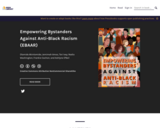
Word Count: 20993
(Note: This resource's metadata has been created automatically by reformatting and/or combining the information that the author initially provided as part of a bulk import process.)

Short Description:
Our goal in writing this book is to empower our graduate-level ESL students to be confident and successful in their fields no matter whether they speak and write English "with an accent" or not.
Long Description:
This book covers five parts: Starting Out in an American Classroom Plagiarism at the ESL Composition Program Reading as an Active Process Writing at the Graduate Level Communication in American Classrooms
Each chapter focuses on different cultural, social, and linguistic concerns that graduate-level ESL students might struggle with.
Word Count: 24124
(Note: This resource's metadata has been created automatically by reformatting and/or combining the information that the author initially provided as part of a bulk import process.)

This subject offers a broad survey of texts (both literary and philosophical) drawn from the Western tradition and selected to trace the growth of ideas about nature and the natural environment of mankind. The term nature in this context has to do with the varying ways in which the physical world has been conceived as the habitation of mankind, a source of imperatives for the collective organization and conduct of human life. In this sense, nature is less the object of complex scientific investigation than the object of individual experience and direct observation. Using the term “nature” in this sense, we can say that modern reference to “the environment” owes much to three ideas about the relation of mankind to nature. In the first of these, which harks back to ancient medical theories and notions about weather, geographical nature was seen as a neutral agency affecting or transforming agent of mankind’s character and institutions. In the second, which derives from religious and classical sources in the Western tradition, the earth was designed as a fit environment for mankind or, at the least, as adequately suited for its abode, and civic or political life was taken to be consonant with the natural world. In the third, which also makes its appearance in the ancient world but becomes important only much later, nature and mankind are regarded as antagonists, and one must conquer the other or be subjugated by it.
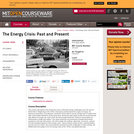
This course will explore how Americans have confronted energy challenges since the end of World War II. Beginning in the 1970s, Americans worried about the supply of energy. As American production of oil declined, would the US be able to secure enough fuel to sustain their high consumption lifestyles? At the same time, Americans also began to fear the environmental side affects of energy use. Even if the US had enough fossil fuel, would its consumption be detrimental to health and safety? This class examines how Americans thought about these questions in the last half-century. We will consider the political, diplomatic, economic, cultural, and technological aspects of the energy crisis. Topics include nuclear power, suburbanization and the new car culture, the environmental movement and the challenges of clean energy, the Middle East and supply of oil, the energy crisis of the 1970s, and global warming.
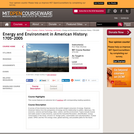
A survey of how America has become the world’s largest consumer of energy. Explores American history from the perspective of energy and its relationship to politics, diplomacy, the economy, science and technology, labor, culture, and the environment. Topics include muscle and water power in early America, coal and the Industrial Revolution, electrification, energy consumption in the home, oil and U.S. foreign policy, automobiles and suburbanization, nuclear power, OPEC and the 70’s energy crisis, global warming, and possible paths for the future.

This course introduces the theory and the practice of engineering ethics using a multi-disciplinary and cross-cultural approach. Theory includes ethics and philosophy of engineering. Historical cases are taken primarily from the scholarly literatures on engineering ethics, and hypothetical cases are written by students. Each student will write a story by selecting an ancestor or mythic hero as a substitute for a character in a historical case. Students will compare these cases and recommend action.

This is a textbook for an Argument and Rhetorical Modes composition class at the community college level.

Thank you for visiting our Tennessee Board of Regents OER Grant English 1020: Introduction to Literature course. The pilot launched in spring 2023. This Walters State Community College composition course focuses on reading and analyzing poetry, drama, and short stories. The course has been designed with Quality Matters standards, Universal Design for Learning concepts, Growth Mindset fundamentals, and Lumen Circles concepts.
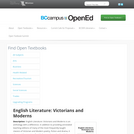
English Literature: Victorians and Moderns is an anthology with a difference. In addition to providing annotated teaching editions of many of the most frequently-taught classics of Victorian and Modern poetry, fiction and drama, it also provides a series of guided research casebooks which make available numerous published essays from open access books and journals, as well as several reprinted critical essays from established learned journals such as English Studies in Canada and the Aldous Huxley Annual with the permission of the authors and editors. Designed to supplement the annotated complete texts of three famous short novels: Henry James’s The Turn of the Screw, Joseph Conrad’s Heart of Darkness, and Aldous Huxley’s Brave New World, each casebook offers cross-disciplinary guided research topics which will encourage majors in fields other than English to undertake topics in diverse areas, including History, Economics, Anthropology, Political Science, Biology, and Psychology. Selections have also been included to encourage topical, thematic, and generic cross-referencing. Students will also be exposed to a wide-range of approaches, including new-critical, psychoanalytic, historical, and feminist.

Shakespeare “doth bestride the narrow world” of the English Renaissance “like a colossus,” leaving his contemporaries “walk under his large legs and peep about” to find themselves in “dishonourable graves.” This course aims in part to correct this grave injustice by surveying the extraordinary output of playwrights whose names have largely been eclipsed by their more luminous compatriot: Marlowe, Jonson, Webster, and Ford, among others. Reading Shakespeare as just one of a group of practitioners – many of whom were more popular than him during and even after his remarkable career – will restore, I hope, a sense not just of the richness of English Renaissance drama, but also that of the historical and cultural moment of the English Renaissance itself. This course will examine the relationship between theatre and society through the lens of the drama produced in response to these changes. However, we will not try to map the progress of drama directly onto the social world, as if the former can simply read off the latter. Rather, focusing on discrete issues and problems, we will try to understand the ways in which a particular text not only reflects but responds to and shapes aspects of the culture from which it derives, developing an aesthetic that actively engages its world. The topics addressed over the course of the semester will be wide-ranging but will include: gender and class dynamics in Renaissance society; money, trade, and colonialism; the body as metaphor and theatrical “object”; allegory and aesthetic form; theatricality and meta-theatricality; the private and the public.